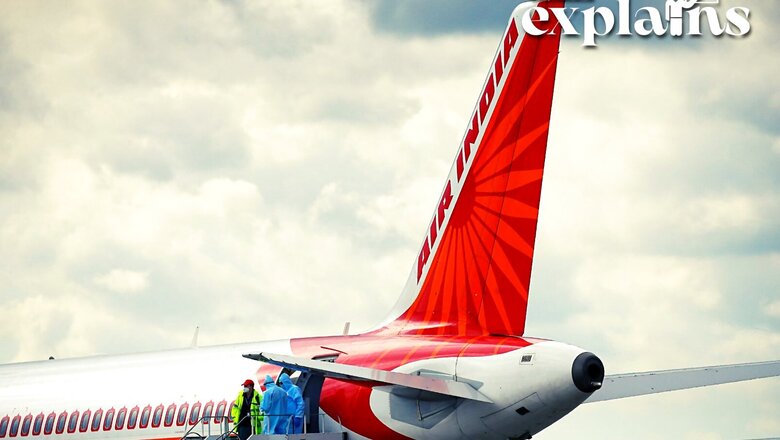
views
Ten days after the shocking November 26 incident on a New York-Delhi Air India flight, another episode of a drunk male passenger allegedly urinating on a female passenger’s blanket was reported on the Paris-Delhi sector but there was no penal action after he gave a written apology, reports said. This incident happened on December 6 on Air India flight 142 and the pilot of the aircraft reported the matter to the Air Traffic Control (ATC) at the Indira Gandhi International (IGI) Airport about it, following which the male passenger was apprehended.
ALSO READ | ‘Unprofessional Conduct’: Aviation Regulator Takes Air India to Task Over ‘Peeing’ Incident
And in the November 26 incident, Tata Group-owned Air India on Thursday told aviation sector regulator DGCA that its staff had not complained to law enforcement about the Mumbai businessman who allegedly urinated on a female passenger on a New York-Delhi flight in November as the aggrieved lady had “rescinded” an initial request for action after the two “appeared” to have sorted out the issue. It further stated that the unnamed business class offender has been banned from flying on Air India for 30 days, pending a report of its Internal Committee.
What are the Rules?
In 2017, the government issued rules to prevent disruptive passenger behaviour on flights, as well as detailed guidelines for a no-fly list.
If an airline finds an unruly passenger, the pilot-in-command must file a complaint, which is then investigated by an internal panel. During the investigation, the airline may suspend the flyer for up to 30 days, a report by Deccan Herald explains. The committee must make a decision within 30 days and specify how long the flyer can be prevented from travelling. If the panel does not reach a decision within the time frame specified, the passenger is free to fly.
A retired district and session judge must chair the committee, along with a representative from a different scheduled airline and a passenger or consumer association.
What About the No-fly List?
The report further explains that Unruly behaviour onboard a plane is a punishable offence, according to the DGCA’s Civil Aviation Requirements (CAR). “Although unruly passengers represent only a miniscule proportion of passengers as a whole, even one unruly passenger can jeopardise safety on board. Unruly passengers have an impact on all personnel involved in the process of a flight operation, ultimately affecting the flight’s operation,” according to the CAR.
What Can Land You on a No-Fly List?
Anyone who disrupts the airline’s normal operations in any way may be placed on a no-fly list.
Airlines have been directed to develop standard operating procedures (SOPs) for situations in which a passenger may become problematic. Unruly behaviour could be the result of a single event of poor service or a condition or effect of a series of such events.
The DGCA has issued an indicative list of unruly behaviour, which includes:
In addition, the watchdog categorises behaviours that will land you on the list into three levels.
Level one includes physical gestures, verbal harassment, and disorderly inebriation.
Level two includes physically abusive behaviour (pushing, kicking, slapping, and so on)
Level three is life-threatening behaviour. This includes causing aircraft damage as well as physical violence such as choking, murderous assault, and so on.
The Ministry of Home Affairs also provides DGCA and airlines with a list of individuals identified as national security threats for inclusion on the no-fly list.
Is there any recourse for someone found guilty by the internal committee?
Any person who is dissatisfied with the airline’s communication of a ban may appeal to an Appellate Committee established by the Ministry of Civil Aviation, which consists of a retired judge of a High Court as Chairman, a representative from a passengers’ or a consumer association, and an airline representative not lower than the rank of vice-president or equivalent.
The rules, however, do not specify the functional details of either the internal committee or the appellate committee, nor do they state whether the accused would be invited to present their case. According to the Civil Aviation Requirements, the decision of the appellate committee is final, and any further appeal must be filed in a High Court, a report by the Indian Express states.
Who has been barred from flying?
The same year the rules were announced, a businessman on a Jet Airways flight from Mumbai to Delhi left a note in the lavatory warning that there were hijackers and explosives on board.
The plane was forced to make an emergency landing. The businessman was the first person to be placed on the no-fly list and charged under the new Anti-Hijacking Act of 2016. A special NIA court sentenced him to life in prison and fined him Rs 5 crore. There have been other instances of disruptive behaviour on flights, but neither the airlines nor the government have taken action to place such passengers on a no-fly list, the report says.
How do other countries manage their no-fly zones?
India is one of the few countries where airlines have the authority to refuse a passenger immediately, it explains.
The no-fly list is more oriented to be a terror-watch programme in aviation markets such as the United States or Canada.
Prior to 9/11, the number of people on the no-fly list in the United States was less than 20, but it quickly grew to thousands. However, cases of disruptive behaviour have resulted in people being placed on the no-fly list in the United States. Delta Airlines in the United States banned a passenger for life in 2016 after he was caught on video shouting profane political comments during a flight.
Read all the Latest Explainers here




















Comments
0 comment